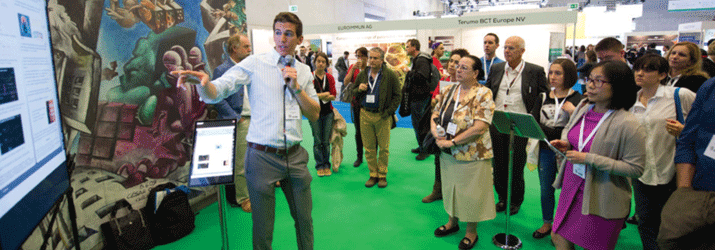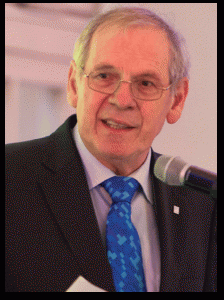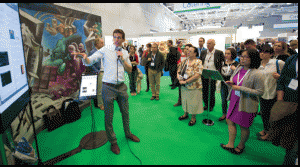

The European Academy of Neurology (EAN) held its 1st Congress in Berlin, Germany, from 20-23 June that was attended by 6400 participants from 106 countries who took part in 8 Symposia, 25 Teaching courses, 23 Focused workshops, 5 Hands-on courses, 3 Interactive sessions, 5 Special Sessions and showed 1546 posters. Furthermore, 2 Scientific Satellite Symposia took place at the Charité, as well as 17 Industry Satellite Symposia.
EAN was set up last year following a merger between the European Federation of Neurological Societies (EFNS) and the European Neurological Society (ENS). The new society unifying all European neurologists is well placed to make major contributions to neurological health care in Europe. This includes playing a coordinating role in education and training in neurology, in neurological practice, and in defining uniform diagnostic and therapeutic standards for patient care in Europe. EAN also has enormous potential for promoting scientific research in neurology as well as the neurosciences in general. It is becoming more and more obvious that neurological diseases have major public health relevance. More than 220 million people in Europe1 suffer from some form of neurological disease – a ticking time bomb for health care systems due to the sheer numbers and costs involved. The incidence of many conditions such as Alzheimer’s and stroke will further increase in an ageing society. This scale and impact of neurological disease in Europe is underestimated and often overlooked, an important health care policy message that came out of the 1st Congress of the European Academy of Neurology.

The main message from this congress is that our members want us to cover the whole spectrum of Neurology and that we need to represent this at the highest level with the most outstanding speakers from all fields. We are happy that the congress was a meeting point of all neurological subspecialties, and both the education programme and scientific presentations covered the whole spectrum of Neurology. Neurology is in the privileged position to have not only a unified voice for Neurology in Europe but also many sub-specialty societies, with the EAN congress being the ideal place for the neurological generalist to meet the neurological specialist, and for specialists to update their general neurology knowledge.
The congress sessions provided much new and breaking content and they were overall well attended. Particularly, the congress highlights session was packed. Among these highlights were presentations on improvements in the understanding of immunological mechanisms of neurological disease and the increasing success of determining and validating biomarkers for neurological conditions such as multiple sclerosis, Alzheimer’s disease and epilepsy. Several large clinical trials were reported to show positive outcomes. Among the hands on courses that were strongly promoted at this congress, the electrophysiological course was particularly successful. EAN has clearly chosen in favour of an e-poster environment. Only e-posters were available during the congress, which was met with enthusiasm by most and some comments for refinement and improvement by others. Last but not least, the epilepsy and Parkinson village were organised for the first time and proved to be a wonderful learning experience that will be continued during the Copenhagen congress.
This congress was not only about science, it was an event with many faces.
Among the several social, educational and scientific sessions, the programme included a new event entitled “Challenges for women in Neurology: sharing experiences”. For European Neurology at least the overt recognition that some women still face unacceptable challenges to progressing their academic or hospital careers represents an innovative idea.
Successful female colleagues in neurology and neuroscience shared professional and personal experience related to their career route. Those on the panel at this inaugural meeting were Angela Vincent, Oxford (UK), Dorota Religa, Stockholm (Sweden), Valeria Caso, Perugia (Italy) and Ana Verdelho, Lisbon (Portugal). The audience included men and women at different career stages, providing a platform for open constructive discussion and sharing experiences, and was particularly enriched by the professional experience of two Egyptian Neurologists. They shared the difficult situation of being women, who want to pursue an academic career in their country, without any type of support and often substantial barriers. Overall the meeting reinforced what we already know – the need to ensure equal opportunities for women Neurologists in academic and hospital careers, and the value in providing opportunities (for both genders) to openly discuss barriers and strategies to overcome these. There remains a striking disparity between the proportion of women enrolled as students in medical schools and the proportion of women who hold senior faculty positions, which may further discourage women from pursuing academic careers, and this needs to change.
Ensuring EAN is in touch with the needs of patients is also an important part of the EAN vision. In line with this a Public Awareness Day was organised around the theme Diagnosing, Treating and Managing Headache and Sleep Disorders at the Neurology Lecture Hall in the Alte Nervenklinik at the Charité Campus. The meeting was a joint initiative by EAN and EFNA – European Federation of Neurological Associations, the European umbrella patient group for neurological illness. The event was moderated by Wolfgang Oertel. After the opening by Gunther Deuschl, President of EAN, the topics headache and restless legs syndrome (RLS), and how these can be diagnosed, treated and managed effectively, were presented: Uwe Reuter spoke about the various forms of headache, their causes and triggers, possible treatment, and coping tips. Claudia Trenkwalder presented RLS, its symptoms, cause and treatment.
For both topics, patients had been invited to talk about how they managed their conditions, and how these disorders had greatly impacted on their home, work and social lives. Following the personal testimonies a lively general discussion was led by David B. Voduše and Wolfgang Oertel.
As it is EAN’s foremost task to improve neurological patient care in Europe, it will endeavour to promote scientific research and ongoing educational events leading towards the second EAN Congress that will take place in Copenhagen, Denmark on May 28-31, 2016.
- Calculation includes EU-27 plus Switzerland, Norway and Iceland; Olesen et al, The economic cost of brain disorders in Europe. European Journal of Neurology 2012;19:155-16.
ACNR 2015;15(4):24. Online 19/09/2015